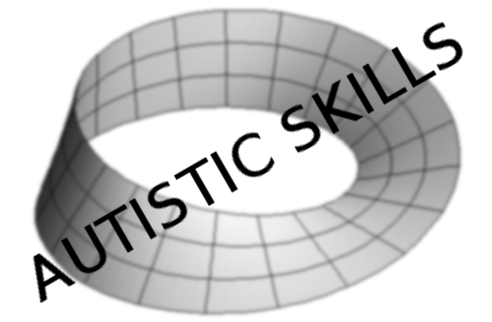

The strengths of autistic communication, being open-minded, free from valuing and reflective, together with autistic scrutiny are the key to understand specific autistic thinking.
Quite often autistic humans experience themselves as researcher within a basicly alien world. For me the strangest issue was that all humans behaved as if they didn't live within a world which couldn't be stranger and weirder. Titles like "An Anthopologist on Mars" or notions like "Wrong Planet Syndrome" show that I'm not the only one feeling like that. This is in fact the attitude of an ethnomethodology. Detail-focussed autistic perception and the "typical" bottom-up thinking of autistic people make them indeed to researchers. To qualitative researchers to be precise. Like a grounded theory they build up a whole out of the jigsaw pieces made of their perceived details. A whole which of course appears rather like a collage than an entire theory. Their incoherent perception processing doesn't show the tendency of pressing the perceived into concepts like coherent thinking does.
At autWorker we realised from begiining on that these workshops are researches: researches on the participants skills of course, but in fact as well researches on autism. On the own autism compared to that of the other participants and the moderators (the "experienced autists"). A comparison as well through communication as through observation. The topical focus, the attendance of the moderatos and the completely autistic environment transform those workshops to unique opportunities to research upon the own autism.
Even the moderators are part of the research process; a fact they have to recognise and watch. With each workshop their horizon of experiences widens; this way they can perform the change of perspectives, as well as between theory-building and experiences beyond the boundaries of a single workshop. It's important to watch accurately the change of perspectives between familiarity and foreignness. Building up a theory means increasing the packing of experiences; analysis within a workshop means (re-)structuring of what is said or written. A good method to achieve this is writing workshop reports. I usually write them about two or three weeks afterwards about each of the participants. Of course the praticipants receive their reports as a feedback. These reports shoud include something about the participants interests and thinking types - the way they were developed within the workshop (in a dense description). They should as well include hints how to further develop their skills and potentials and give answers to questions which arose within the workshop.
In order to get a workshop working the participants have to feel safe. It's the first few minutes which decide if it will succeed or not. In the case of success all participants experience the workshop as a secure and barrier-free communication environment. This is the case if from beginning on the participants recognise the workshop corresponds to their way of communicating. It's a place where autistic people feel understood - and are understood. The communication is characterised by being open-minded, value-free, interested and reflected; the moderators should act as best practises. This way the workshop becomes a dialogue based introspection, for which the same rules apply. It becomes a research context - if the results are documented in a proper way. With their openness and reflections the participants donate the moderators a high amount of confidence which should be treated with responsibility.
The moderators attitude is the most important aspect of a workshop. It can be described as mindful. One aspect of mindfulness is inner mindfulness: reflecting ones own emotions, perceptions and sensations, being aware of ones own thinking in each moment, in particular perceiving the participants within ones own feelings and thoughts. If I perceive inner unrest for example this can be - and likely is - the unrest of one or more participants, mirrored by my feelings. It's important to recognise this and react in an appropriate manner; autistic humans are mostly very sensitive to feelings of other humans. Another aspect is mindfulness of perspection: perceiving things, the perceived, just as it is, without judgement, without interpretation. It's a constantly pending attention, the interest of an ignorant, the curiosity of an adapt. The third aspect is the outward mindfulness, the knowledge of ones owns effects to the participants: What do they perceive while perceiving me, what do they see while watching me? For the participants moderators are like mirrors - anyway if purposed or not. This is why it is so important to know and to be aware of what you are mirroring to them.
Usually mindfulness is seen as something which has to be "painfully" achieved by exercises or meditations. Autistic people were born into such a kind of mindfulness. From beginning on they live within a torrent of their perceptions and associations, open towards creatures and objects without judgement or interpretation. They watch consciously how their thinking administers their perceptual torrent and interconnects it to associative networks. They watch how language places itself above thes networks and tries to build up a second reality - often flawy and fragmentary. But very often they forget about their mindfulness, because they feel threarenend by their openness or because they learn that they don't fit to common ways of interacting and communicating. The job of the moderators is only to find back to their own specific autism, to re-discover it, integrate it into their lives and to develop it. They find back to the autistic world they once were born into and discover the treasure hidden in there. At the end it's the autistic world of the moderators in which the participants of a workshop "autistic skills" mirror themselves.
For moderators workshops "autistic skills" are a way to learn successively about autism, autistic humans and oneself with ones own specific autism and to get a better understanding.